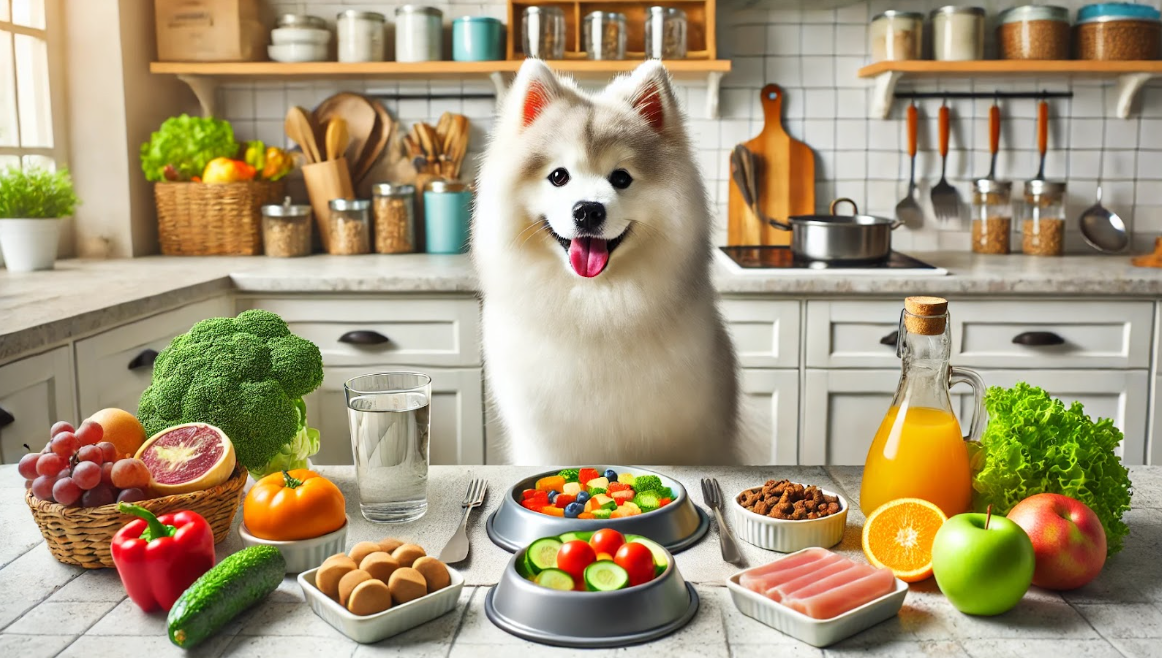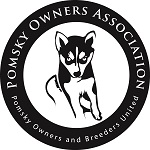Feeding your Pomsky the right diet is crucial for their health, happiness, and longevity. Pomskies, a mix between a Pomeranian and a Siberian Husky, inherit traits from both breeds, which means their dietary needs can be unique. Ensuring that you provide a balanced diet with the right nutrients can help prevent health issues and keep your furry friend in the best possible shape. This article will guide you through what you should and shouldn’t feed your Pomsky, covering everything from healthy options to foods that are best avoided.
 Understanding Your Pomsky’s Dietary Needs
Understanding Your Pomsky’s Dietary Needs
Pomskies are energetic, playful, and intelligent dogs that require a balanced diet to maintain their high energy levels and overall health. Like all dogs, they need a mix of proteins, fats, carbohydrates, vitamins, and minerals. The key to a healthy diet is variety and balance, ensuring that they get all the essential nutrients.
The Basics of a Balanced Diet
- Proteins: Essential for muscle development and repair. Sources include chicken, beef, fish, and turkey.
- Fats: Provide energy and support skin and coat health. Healthy fats can be found in fish oil, flaxseed oil, and chicken fat.
- Carbohydrates: Offer energy and aid digestion. Good sources are sweet potatoes, brown rice, and oats.
- Vitamins and Minerals: Crucial for overall health, including immune function and bone strength. These are often found in fruits and vegetables.
Feeding your Pomsky a diet rich in these nutrients will help them thrive. However, it’s also important to be aware of foods that are harmful to dogs and should be avoided.
What You Should Feed Your Pomsky
Incorporating a variety of healthy foods into your Pomsky’s diet can ensure they get the nutrition they need. Here are some safe and nutritious options:
High-Quality Dog Food
Choosing a high-quality commercial dog food formulated for small to medium breeds is a good starting point. Look for brands that use natural ingredients without fillers or artificial additives. Check the ingredient list for whole proteins, healthy fats, and complex carbohydrates.
Lean Meats
Lean meats like chicken, turkey, and beef are excellent sources of protein. Cook the meat thoroughly and avoid adding any seasonings, as some spices can be harmful to dogs.
Fish
Fish such as salmon and sardines are rich in omega-3 fatty acids, which are beneficial for your Pomsky’s skin and coat. Ensure the fish is cooked and bones are removed to prevent choking hazards.
Fruits and Vegetables
Many fruits and vegetables are safe and healthy for dogs. Carrots, blueberries, and apples (without seeds) are great snack options. Leafy greens like spinach and kale are also nutritious. A common question among pet owners is, “is broccoli good for dogs?” The answer is yes, broccoli can be a healthy addition to your dog’s diet in moderation. It’s rich in vitamins and fiber but should be given in small amounts to avoid digestive upset.
Eggs
Eggs are a good source of protein and essential fatty acids. They should be cooked to reduce the risk of salmonella.
Rice and Oatmeal
These grains are gentle on the stomach and provide a good source of energy. They are especially useful if your Pomsky has digestive issues.
What You Shouldn’t Feed Your Pomsky
While many foods are safe and beneficial, some can be harmful or even toxic to dogs. It’s crucial to know which foods to avoid to keep your Pomsky healthy and safe.
Toxic Foods
Several common foods can be toxic to dogs and should be kept out of reach:
- Chocolate: Contains theobromine, which is toxic to dogs.
- Grapes and Raisins: Can cause kidney failure.
- Onions and Garlic: Damage red blood cells and can lead to anemia.
- Avocado: Contains persin, which can cause vomiting and diarrhea.
- Alcohol: Even small amounts can be harmful or fatal.
Foods That Can Cause Digestive Issues
Some foods aren’t toxic but can still cause digestive problems or other health issues. These include:
- Dairy Products: Many dogs are lactose intolerant, and consuming dairy can lead to upset stomach, diarrhea, and gas.
- Fatty Foods: Foods high in fat can cause pancreatitis, a serious condition in dogs.
- Bones: Cooked bones can splinter and cause internal damage or blockages.
- Artificial Sweeteners: Xylitol, a common sweetener, is highly toxic to dogs and can cause liver failure.
Creating a Feeding Routine
Establishing a consistent feeding routine is essential for maintaining your Pomsky’s health. Feed your dog at the same times each day and provide measured portions to avoid overfeeding. Monitor their weight and adjust the food quantity as needed based on their activity level and overall health.
Treats and Snacks
Treats are a great way to reward your Pomsky, but they should be given in moderation. Choose healthy treats and avoid those with artificial ingredients or excessive sugars. Small pieces of lean meat, carrots, or specially designed dog treats are good options.
Hydration
Always ensure your Pomsky has access to fresh, clean water. Hydration is vital for digestion, nutrient absorption, and overall health. Change the water daily and clean the bowl regularly to prevent bacteria buildup.
Consulting with a Veterinarian
Before making any significant changes to your Pomsky’s diet, consult with a veterinarian. They can provide personalized recommendations based on your dog’s age, weight, activity level, and health status. Regular check-ups will help ensure your Pomsky remains in optimal health and can alert you to any potential dietary concerns.
Conclusion
Feeding your Pomsky a balanced and nutritious diet is fundamental to their well-being. By incorporating a variety of healthy foods and avoiding harmful ones, you can help your furry friend lead a happy and healthy life. Remember to consult with your veterinarian, establish a consistent feeding routine, and always stay informed about the best dietary practices for your Pomsky. With the right care and attention, you can ensure that your beloved pet thrives and enjoys their meals every day.

